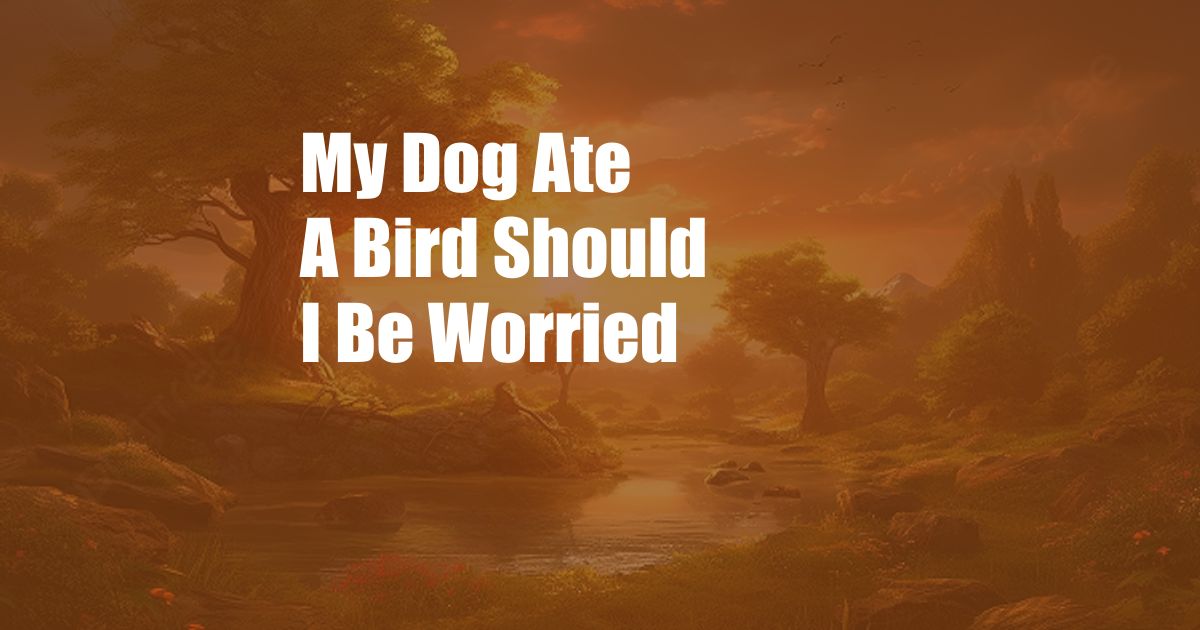
My Dog Ate a Bird: Should I Be Worried?
As a loving dog owner, I’ve experienced the occasional fright when my furry friend has eaten something he shouldn’t have. One such incident involved a bird. My dog, Buddy, is a curious and energetic creature, and one day, he managed to catch a small bird in the backyard. I was horrified, and my mind raced with questions: Is he going to be okay? Can dogs get sick from eating birds?
To put your concerns at ease, I decided to delve into the topic and share my findings with you. Join me as we explore the potential risks and important steps to take if your dog has eaten a bird.
Potential Risks of Dogs Eating Birds
Parasites
Wild birds can harbor various parasites, including intestinal worms and protozoa. If your dog ingests a bird infected with parasites, he could become infected as well. Symptoms of parasitic infections can range from mild digestive upset to more severe issues like vomiting, diarrhea, and lethargy.
Bacterial Infections
Salmonella and E. coli are common bacteria found in birds. These bacteria can cause gastrointestinal symptoms in dogs, including vomiting, diarrhea, and abdominal pain. In severe cases, bacterial infections can lead to more serious health complications.
Nutritional Deficiencies
Birds are not a nutritionally complete food source for dogs. If your dog eats a bird, he may not get the essential nutrients he needs, potentially leading to nutritional deficiencies. Symptoms of nutritional deficiencies can include weight loss, poor coat condition, and lethargy.
What to Do if Your Dog Eats a Bird
If you witness your dog eating a bird, it’s important to remain calm and follow these steps:
- Monitor your dog closely for symptoms: Keep an eye out for any signs of discomfort, including vomiting, diarrhea, or lethargy.
- Contact your veterinarian: Call your vet as soon as possible to inform them of the situation. They will provide guidance on whether to bring your dog in for further evaluation.
- Bring in a stool sample: If your dog shows any symptoms, your vet may request a stool sample to check for parasites or other infections.
- Provide plenty of water: Dehydration can worsen symptoms, so make sure your dog has access to fresh water at all times.
Tips for Preventing Your Dog from Eating Birds
To minimize the risk of your dog eating birds, consider these tips:
- Keep your dog on a leash: When outside, keep your dog on a leash to prevent him from chasing and catching birds.
- Supervise your dog: Never leave your dog unattended in areas where birds may be present.
- Train your dog: Teach your dog the “leave it” command to prevent him from eating things he shouldn’t.
- Remove bird feeders: Bird feeders can attract birds to your yard, increasing the chances of your dog coming into contact with them.
- Cover outdoor areas: If you have a fenced-in yard, consider covering it with a net or mesh to prevent birds from entering.
FAQs about Dogs Eating Birds
Q: Can dogs die from eating birds?
While it’s rare, dogs can die from eating birds if they contract a severe illness or injury from the bird.
Q: What are the symptoms of bird-related illnesses in dogs?
Symptoms can range from mild digestive upset to more severe issues like vomiting, diarrhea, lethargy, and seizures.
Q: Should I induce vomiting if my dog eats a bird?
Do not induce vomiting unless your veterinarian instructs you to do so. Inducing vomiting can be dangerous and may worsen the situation.
Q: What should I do if I find a dead bird in my yard?
Dispose of the dead bird immediately by burying it or placing it in a trash receptacle. Wear gloves when handling the bird.
Conclusion
While dogs eating birds can pose some risks, it’s important to remember that most dogs will recover with proper care and treatment. By understanding the potential hazards and taking preventive measures, you can help keep your furry friend safe and healthy.
Are you interested in learning more about pet safety and health? Browse our website for a wealth of informative articles and resources.